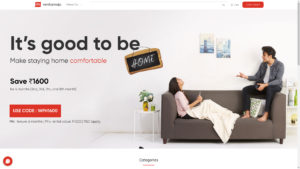Through several of our past interviews & insights captured from venture capital data in the US, Europe & Asia, we share with you ideas that VCs in India will absolutely love!
Over the years, at Smart CEO, we have narrated for our readers an undiluted, nuanced, first-account of the journeys of India’s most exciting entrepreneurs. When our content team sat down for a discussion to plan our calendar for 2018, we wanted to rejig a few things.
Most importantly, we wanted to reinvent our approach to content creation with a ‘reader-first’ approach. I would admit that over the last few years we went for a ‘founder-first’ approach, wherein the focus of a story was on the person we interviewed. Of course, we shared some brilliant anecdotes and learnings experiences from their startup journeys, but we didn’t design a story with a reader-centric mindset.
With the cover story this edition, the focus is entirely that. For the record, we haven’t interviewed any specific person for this article; Instead we mulled through several of our interviews, and captured insights from venture capital data in the US, Europe and Asia. The outcome is a collection of 5 Startup Ideas – ones if strategized and implemented well can evolve into potentially billion dollar ideas. At least, that’s what we think.
Here’s how we went about the process of picking these 5 Ideas.
- We started off with a Master List of 100 Startup Ideas for the Indian Entrepreneur. We followed a simple approach; We simply listed 100 or so problems we see around us as consumers and business owners, and then explored creative solutions to these problems.
- From the Master List, we picked 60 Ideas we really loved. Of course, this process was run driven by the gut of our content team rather than being data-driven.
- We first thought of presenting all 60 ideas into this edition, but that wouldn’t be smart. At a price point of Rs. 200 per magazine, it wouldn’t make sense to give away billion dollar ideas for almost free, exclaimed our marketing head. So, we decided to give out 5 ideas for now and then based on feedback from our readers, we would figure out a way to monetize the 60 Ideas List.
Each of the 5 Ideas we present here fits the following criteria:
- The first, can the idea rapidly scale? If the team at the helm is good, we believe venture capital investors will love backing these ideas. The goal is certainly not to suggest ideas to build lifestyle businesses or solve small problems.
- The second criteria revolved around a question we tried to answer: Is the market ready? Meaning, we shouldn’t be too early or too late.
- The third filter was – Can we build a Big Brand with this idea? Can it become like an Under Armour taking on Nike? Can it become a Chobani taking on Dannon? Can it become a BigBasket that can take on and beat a Big Bazaar? Can it become a BuzzFeed that would compete with NewsCorp?
Needless to say, any idea is as good as its implementation. Our job as idea generators is an easy one. Implementation – building a team, raising capital, building a brand, selling, marketing, sustaining the business over the long term – are all extremely hard. Warren Buffet famously said, “I’d any day back a great team working on a mediocre idea rather than a mediocre team working on a terrific idea.”
Also, tens if not hundreds of people will approach solving the same problem with variations to the same idea. The differentiation will come from what the entrepreneur can bring to the table. You may think Flipkart and Amazon (or Flipkart and Alibaba) are pursuing similar ideas. But, that would be just looking at it on the surface. As an entrepreneur, you’ll have to peel layers and layers into an idea to build something truly differentiated. As a consumer, you may think Flipkart and Amazon are two highly capitalized e-commerce firms, but ask the Bansals or Bezos and they would argue that Flipkart and Amazon are totally different businesses. The point is the implementer of an idea has to bring a deep personal touch and viewpoint into the process of building a company.
And now that we have given enough of a buildup… presenting to you our first cover story for the year: 5 Startups Ideas for India that VCs will love. Thank us as you rake in the big bucks and don’t hate us if you lose big!
And, read this next line really fast like in a mutual fund ad: Any startup idea is subject to market risk and entrepreneur risk.
Idea #1
Car-as-a-Subscription
The idea we’re proposing here is to build a venture that would offer consumers the ability to “rent cars on a monthly basis”, replacing the need to own a car. We believe there is tremendous opportunity to disrupt the future of car ownership in India. We know there are ventures like Zoomcar that operate in the weekend/short-term rental segment. Our idea is to build a company that would allow people to rent for 3-months, 6-months, 12-months or more. Basically, long-term rentals for durations less than a lease.

The Opportunity
Two big expenditures people often indulge in after landing a good job is buying a car and buying a home. While the latter makes financial sense, simply because the underlying asset appreciates over the long run, owning a car is a lifestyle decision. The opportunity for this ‘CaaS startup’ is to deliver a better product (giving consumers the equivalent of owning a variety of cars) while at the same time offering better financial terms (lesser than EMIs for owning or leasing)
Value Proposition
- Deliver cost savings: Give people the same or better experience of car ownership at a much lower cost
- Deliver better customer experience: The consumer can easily, with a simple mobile app, upgrade and downgrade cars at will and experience ‘ownership’ for multiple cars.
Silicon Valley Inspiration
If you believe in this idea, the one company you must study is Fair.com. The company founded by Scott Painter has raised over US $1 billion through a combination of debt and equity and has created a market for the future of car ownership that is extremely flexible and digitally-driven. The company counts the likes of BMW & next47 (the VC firm backed by Siemens) among its equity investors and has raised debt from Goldman Sachs.
The Details
While a detailed analysis of Fair.com is worth the effort, if you’d like to build a CaaS startup for India, it is crucial to redesign the model for our country. Would you restrict the network of cars you rent out to certified, pre-owned? Would you work directly with automobile manufacturers or would you partner with a collection of dealers? Would you start at the high-end and deliver this CaaS model only for luxury cars? What is the customer acquisition strategy? And, this list of questions can be endless.
As serial entrepreneur K. Ganesh said in one of our interviews, the primary role of an entrepreneur is formulating strategy, in addition to fund-raising and hiring. The key to launching, scaling and building a billion dollar CaaS startup will lie in ironing out the finer details like maintenance and insurance strategy, inventory management, financing, market positioning and customer acquisition.
Idea #2
The Under Armour of Office Furniture
For a while, we thought nobody could take on Nike in the world of sports. But, the Kevin Plank-led company (Under Armour) did just that. In less than two decades after launching the brand with a dry-fit t-shirt for football players, the company has become the Apple of sports apparel. The underlying reason for Under Armour’s success can be described with one phrase: User-Centric Design. The company’s product development team has focused on embracing next generation technology to solve athlete-specific problems. Our idea to build a design-centric office furniture brand draws a page from Under Armour’s Playbook. Bring in technology and user-centric design to the world of office furniture at reasonable price points. We suggest the first product be a Standing Desk, with a minimalistic, contemporary design.

The Opportunity
Ever tried buying furniture for a small office? Right from finding the right chair to getting it delivered, the process is chaotic. And there is also the constant complaint of back and shoulder aches, thanks to one-size-for-all chairs and ill-planned desk heights. And, unless you’ve the budget to afford a Herman Miller, most of the furniture looks archaic. We believe there is a big opportunity to bring Under Armour-inspired R&D to office furniture design and build a brand around this. If you can also make it affordable, you’ll have a sure shot winner.
Value Proposition
- A Product that works: We suggest you launch this startup with three simple product categories: chair, office table and standing desk. Build a R&D and User-Centric Process to deliver a product that people simply love and rave about.
- Solve for known posture issues: Just like Under Armour designed a t-shirt to tackle the issue of sweating, you’ll have to design the product to fix known pain points.
Inspiration
If you believe in this idea, there are several companies you should understand deeply. Of course, Nike and Under Armour could be wonderful role models. More inspiration can come from the likes of Casper, the company that reinvented the mattress and IDEO, the product innovation and design firm.
Specifically, in the furniture industry, the firm you’d want to emulate is a Vancouver-based, furniture startup called Article. The company touched US $100 million in annual revenue in 2017, up from US $50 million in 2016. And, the company has raised minimal outside capital.
The Details
Right from deciding the brand name and communication strategy to product development process and logistics, every aspect will play a role in shaping up the brand.
Should you launch with only one product, say a Standing Desk, or launch with 3 products? How do you hire and train the right set of people? How will you raise capital to prove product-market fit? What is the strategy to manage cash flow during the research phase? All these are questions that need answers.
What does your gut say about this idea? Write to us at marketing@growthmechanics.in and let us know.
Idea #3
A Stress Management Toolkit
Ever tried using Calm.com, the meditation app? It is a beautifully designed app to help users mediate on-the-go or even at work just sitting in your chair. Apparently, it was first designed in Silicon Valley to give software developers a breather and get back to work after a reset. I first heard about it from angel investor Jason Calacanis, who is one of the investors in the company, and have used it ever since. The other startup in this segment is Headspace.com, which operates around a simple mission: “Train your mind for a happier, healthier life”. The idea we’re proposing here is to build a Calm.com or Headspace.com for the Indian audience. There may be potential to make it an enterprise-focused app with a B2B business model to begin with, before taking it the consumer route.

The Opportunity
It is unbelievable how much stress and anxiety we’re witnessing amongst people world over. A leading Indian mental health expert recently told me something that is very scary: “Over the last 5 years, people who she thought would never have anxiety/stress issues have now developed it.” Moreover, the incidence of stress amongst the sub-30 age group is also going up. I am carefully avoiding the phrase mental health to emphasize on the need to build a toolkit or system to tackle stress, way before it become a more serious mental health issue.
Value Proposition
- Preventive Health rather than Problem Solving: The idea is to reduce stress and anxiety way before it becomes even a minor problem.
- A basket of mindfulness solutions: Waiting outside the hospital ward for a loved one? Gearing up to write a board exam? Your product should be designed to deliver guided meditation programs for a variety of situations.
It’ll scale
When Headspace.com was launched by Andy Puddicombe, a former Buddhist Monk, the first thing critics mentioned was it wouldn’t scale. However, as of February 2017, Headspace.com has over 12 million downloads, and over 500,000 paid subscribers. Don’t worry about what you’ll say in your pitch deck to VCs. The need for stress management as a catalyst for good health cannot be emphasized enough. Go ahead and launch.
The Details
Who could be the voice of your guided meditation? What about background music and live visuals? How about have a premium subscription package, in addition to a basic pack, with celebrity voice overs and stunning visuals. The success of this app will lie in the creativity and personal touch of the entrepreneur. Go crazy and experiment. Believe what you are doing is important.
Idea #4
Online + Offline AI University
Artificial Intelligence (AI) has been a buzzword for a long time now. But it really went mainstream in 2017 when Sundar Pichai announced Google’s Product Strategy for an AI-first world. Within the realm of AI, we’re already seeing working applications in speech recognition, computer vision and machines that learn. If 2007 was the inflection point for data analytics and 2011 for a mobile-first world, the time for AI is now.

The idea we have is to build a hybrid university (online classes combined live classroom engagements) for cutting-edge AI courses. Think Udacity for AI, but with a live classroom as well. Of course, the likes of Coursera and Udacity are developing their own AI curriculum, but these only skim the surface. An AI-focused university can be a game changer, which can be acquired by some of these bigger players. Also, we don’t believe online-only education will make the cut. There needs to be a live classroom component to the course. Think NIIT for AI and next-generation tech education.
The Opportunity
While the idea we’re proposing is for the world at large, we think an Indian startup dedicated to build an army of AI-Engineers can be a critical value addition to India’s business ecosystem. As of today, India’s leading tech companies are still plotting their AI strategy, but soon they would need a big chunk of AI talent and currently that talent pool is simply not available. Flipkart acquired a Silicon Valley-based company to start implementing its AI roadmap. If your startup can deliver 10,000 job-ready AI-Engineers in Year-1, the market would easily absorb this talent, and your startup will be acquired by one of the bigger edtech players, in case you opt for an early exit.
Value Proposition
- AI and AI only: Most edtech players are offering courses in digital marketing, data analytics and general management programs. There’s a gap for high-quality AI curriculum.
- Deliver Jobs: The key to building a successful edtech company for the post-college crowd is to bring to the table high-quality job interviews; build an ecosystem of recruiting partners and your offering becomes more attractive.
Silicon Valley Inspiration
Coursera, EdX and Udacity – all offer courses on AI. Yet, we think there is a problem. These courses miss an important aspect of helping students become truly job-ready. Also, a lot of these courses are for advanced learners, who already have prior experience in software engineering. Our idea is to nurture ‘early career software engineers with AI capabilities’.
The Details
The biggest challenge we foresee is finding high-quality AI leaders who can co-create the curriculum with you. It could either be a company or an individual you partner with. Also, this won’t be an easy business idea to raise venture money for. VCs like to see a large addressable market upfront; In this case, you’ll have to do the work on establishing a market for AI engineers. Maybe, after the AI courses see some traction, it may make sense to extend the course catalogue to emerging technical fields like VR/AR, Blockchain, Robotics, 3D Printing, IoT and Next-Gen Cybersecurity.
Idea #5
Rethinking a Business Hotel
Be it a luxury hotel or a no-frills business hotel brand, there is really very little differentiation in the hotel industry. The unique selling points of most hotels are the same – restaurant options, room with a view and a good gym. But, how about we rethink this idea entirely?

How about replacing a gym with a new fitness concept? How about chef-centric pop-up restaurants that change every quarter? How about redesigning the room to have a library stocked with best sellers? InterContinental Hotels has actually launched a brand called EVEN, which are wellness-themed hotels. Each room has a fitness corner complete with guided workouts on TV. The parent company of Soul Cycle, Equinox Group, plans to open a fitness-themed hotel at New York’s Hudson Yards with deep focus on multiple fitness options for guests. The idea is to build a hospitality brand that delivers a unique guest experience that goes beyond the usual.
The Opportunity
While debating this idea within our team, we spoke about a set of challenges for this idea. For starters, the Business Hotel industry in India is highly price sensitive. Two, people are busy all-day, in which case the hotel is a bed-and-breakfast place. But the opportunity really lies in delivering a differentiated guest experience that people truly love and more importantly is unique and defensible.
Value Proposition
- Guest Experience: Deliver a guest experience that goes beyond the usual; For example, in the US, the idea of a fitness-themed business hotel is catching on; There may be a gap in the market for a gastronomy-themed hotel with branded chefs only.
- Repeat & Referral Guests: What may also be crucial is to build a business model with a well-designed loyalty program for guests to keep coming back and refer other people
Global Inspiration
From within the hotel industry, Equinox Group’s upcoming fitness-themed hotel and EVEN by InterContinental are good role models to start with. But, that’d not be the only inspiration. Ideas can come from several quarters – from the likes of Disney to retail concepts like Whole Foods.
The Details
The key decision to be made if you decide to pursue this idea will be around determining the star rating and price points you want operate at. OYO, for example, built its community-centric hotel brand, Townhouse, with the budget-focused traveler in mind. However, it may make sense to design this for the discerning traveler. Additionally, the first two hotels may have to be owned by the brand, before you start pitching for management contracts. So, this requires the ability to raise enough capital. We would think, this idea, atleast among the five suggested, will be the most difficult to implement if you do not have domain expertise in the hotel industry.
Entrepreneurship Leadership



